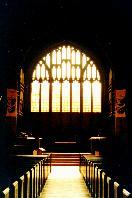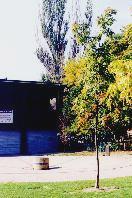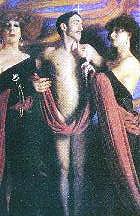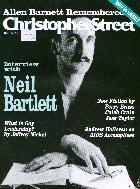|
Promiscuous Affections A Life in The Bar, 1969-2000
1987-1991:
|
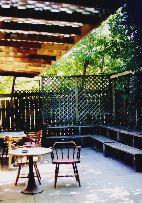
Quiet for now: Back patio at The Toolbox, 508 Eastern (quiet with excuse in this shot, taken on a Monday afternoon, Aug 1999). |
I needed these casual, living connections, my more usual ones caught up in death & dying.
Even among these beautiful men, I now had an odd sense of their mortality. What a wonder that these mere bodies -- how messy & fragile bodies are, how similar we are in that -- should be a source of such magic.
1991
June through December
- Sunday, June 23, 1991, to Jane:
I'm back from a lazy afternoon at The Toolbox, that bar I like making the destination of summer walks. I found it quiet but an event was in the works, a beer bust (pay $10, drink all the draft you want) leading to the Mr Drummer Toronto contest at 6:00.
That wouldn't have kept me but the crowd gradually growing around me as I sat on the patio did: a couple of people I knew well enough to talk to, some others I'd seen before, one I'd noticed especially before, a skinny man named Todd I used to watch play pool. I ended up in the middle of a crowd of baseball players, Todd one of them, and stayed until 7:00.
They serve there a concoction of Sloe gin, draft beer, ginger ale and about half a bucket of ice, all tossed together in a quart pitcher. The patio is full of people hefting these big jugs, sucking up sweet frosty goop through double straws. It's called, heaven knows why, a Skip 'n' Go Naked. Some people do, too -- not entirely, but this being an older leather crowd there are a lot of bums and beer bellies left unembarressedly hanging out.
I didn't have one but Todd had five and kept filling my draft mug from his pitcher. I was charmed by that -- and soon enough smashed. Well, not that smashed. I said goodbye to a very Sloe eyed Todd (he was there with his lover), made it home fine and here I am.
I was in some need of these casual, living connections then, my more regular ones too wrapped up in death and dying. In February I had told Jane about finding Ted at Colby's, at the pool table with other players. One was André, a small flirtatious boy who, once in fun called a slut, said: "I'm not a slut, I'm French."
Another was also not a slut, merely French. Behind his bar at The Barn his sly look suggested he might offer more than a beer (if likely not; he was lover to the manager). At a pool table he read more shy. Even among these beautiful men, I now had an odd sense of their mortality.
-
Last night I wondered just why these faces should mean so much, or if I could ever say what they mean. That these mere bodies -- and how messy and fragile bodies are, how similar we are in that -- should be the source of such magical pleasure.
I can look at them now and see all that bursting energy gone, large babies who'll need their diapers changed. It's not morbid: I don't cringe at the thought -- I marvel at who they are, physically, now, not in contrast but in some kind of continuity.
And those bodies, all finally the same, carry the history of each one of them -- all different. What years of living give Ted that laugh, André that quiet smile? I don't know. I know they're gay, and that anyone who's gay and can still offer the world real laughs, real smiles, has preserved something fundamentally good, generous, through a lot of confusion and pain that is often there to see too.
I love all that they give, all that they risk -- and finally what I love in being with them is the chance to discover exactly what's being risked: who is this person? Will he let me find out? Every word, every smile, is a door opened just a bit, a gift of trust and I love it.
***
I had changed Michael Lynch's diapers (adult ones) many times by now. It wasn't hard. In January he'd conceded to a hospital bed -- in Stefan's room, the hard climb up to the loft long abandoned -- making all such tending easier to do.
For some time there hadn't been much tending, Michael no longer the odd mix of little baby and old man he'd seemed, but himself again. He, Stefan and I once went out for a stroll, Michael in his wheelchair. He hadn't stopped eating but ate only when and what he wanted: on another jaunt it was Kentucky Fried Chicken.
Once at home he wanted both grits and scrambled eggs; I braved the delicate timing needed for both at once. I was least confident cooking for him, knowing his standards. He said both were fine but I didn't quite believe him.
Michael was generous with what must have been shortcomings on my part. The last time he'd ever taken me to task was in late 1978, over promo I'd done for The Body Politic, featuring New York historian Martin Duberman calling TBP "the most sophisticated, courageous and incisive gay news periodical in existence."
Michael had been scathing about my using a "star" testimonial -- and an American star to boot.
Gerald later told him he'd hurt me. He never did again. When he wrote for the paper I was his editor, our small contests of will in that always bracing, fun. As I told Jane in late May: "My times with him are fine. I resist St Michael, which to too many people he has become, but I still like Michael Lynch well enough. (And I suppose no one is a saint to his editor.)"
***
Michael could be hurtful with those he trusted to take it: Ed Jackson, Gerald Hannon, Alan Miller -- and most often his son Stefan. He had settled in for however long this might last, at 19 still the dutiful son of a loving if always demanding father.
His mother Gail, who had been here in January, was back now too. I had known Gail as long as I'd known Michael, if not so continuously. In late 1979 she had met lesbian performer Pat Bond, here to do her show as Gertrude Stein. Michael had played host and done a feature article on her.
Gail and Pat had been quite taken with each other, Gail in time moving to California to be with Pat. She had died in late 1990. "Michael and Pat are my real history," Gail once told me. I was glad to see her again, glad especially for Stefan.
***

Michael Lynch, 1986. He would see his last Pride Day five years later, wanting "to soak it up" -- & not past noting pretty boys. |
"We must come to see death & dying not as opposed to life, but rather as a part of living. We must make dying gay -- in our own terms."
Michael Lynch
in The Body Politic, 1982.
Michael's legacy
Michael's CV, done in Mar 1990, used by Gerald & me for his obit, ran to 10 pages. It listed 17 affilliations (co-founder of the Toronto Gay Acdemic Union 1975 & the Whitman in Ontario conference 1980; Gay Studies Newsletter (editor for 9 years); a book of poetry, These Waves of Dying Friends (other books in progress); 13 papers; 10 invited lectures; 9 published poems; 56 articles.
Your usual English prof's CV.
What made it extraordinary is what came of Michael's work: with Toronto's Gay Alliance Toward Equality 1972-76; as chair of the Committee to Defend John Damien 1977-79; co-founder of the AIDS Committee of Toronto 1983; & the The Toronto Centre for Lesbian & Gay Studies 1988.
His articles (32 in TBP & Xtra) led to action: Gay Father's of Toronto 1978; AIDS Action Now! & the AIDS Memorial, 1988. We said in his obit, "You couldn't have walked through Pride Day without encountering the works of Michael Lynch."
He left us pride in ourselves & our sexuality; passionate friendship; Whitmanesque "adhesiveness," & tons of stuff in the Archives. Best of all, he left us his most beloved creation: Stefan Lynch.
It's rather a cliché to say that the real Afterlife is what we leave to the world. But it's true: We become what others beheld, what they recall of us.
Michael touched the lives of many who never had (or will have) the chance to know him in life. Wherever he is, if there is such a place, he well deserves to be dancing.
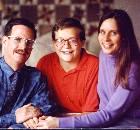
Michael, Stefan & Gail Lynch. 1986, in California. Photo (& Michael above): Lewis papers, CLGA. |
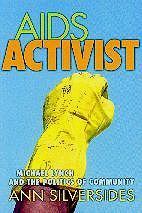
Michael's biography:
|
On Sunday, June 30 I arrived at Michael's to take him out for Lesbian and Gay Pride Day. He'd been unsure about going when I'd called earlier, but a half hour later Stefan called and said, "Michael is in the process of changing his mind."
He hadn't yet sat up that day until Stefan and I got him dressed, so thin now that his 501s -- even over his diapers -- slipped down his hips as he was going out to the cab. He got angry at Stefan over that, scolding him for not choosing better clothes. Stefan had planned to come with us but I didn't blame him for changing his mind as well. I'd thought others might be along, too, but in the end it was Michael and I and his wheelchair, on our own.
- Monday, July 1, 1991, to Jane:
We did well enough on our own, though after two hours of negotiating through the crowds (and negotiating with Michael, trying to make sure I was wheeling him where he wanted) I was a bit pooped. So was he. But I think he enjoyed it, being in the middle of that crowd, the centre of attention whenever we found anyone who knew him -- and many people did.
He told me he was in no hurry, that this was likely his last Pride Day and he wanted to soak it up. And so he did, I think. It was hard for me to tell how he was reacting: I couldn't see his face under his hat from behind; couldn't even hear him most of the time unless I stopped, bent down beside him.
He had a few comments as we went through the AIDS Memorial, was happy to be brought the model of the permanent one he helped choose and which, if all goes as planned, will be mostly built by Pride Day next year. [In the end it took until 1993.]
And wheeling down Church Street he turned back to tell me we'd just passed two very pretty boys.
It was Michael's last Pride Day. At 2:30 pm on Tuesday, July 9, Stefan asked Jeff Braff, then on shift, to call Eddie at the office. He and I got a cab. Jeff, Natalie and Gail's lover Sandy, also up from California, were in the living room, Stefan and Gail in with Michael, the door closed.
Eddie went in, I did not. He came out a half hour later. Michael's heart had stopped just before we got there. Stefan, still in with his father, began sobbing, loudly. He had told us he would fall apart when he finally could. By the time I left at 5:00, not needed there as others arrived, Stefan had not come out of the room.
After I left I went to Xtra to find Ken Popert and see about getting space for an obit. Then I went back to ACT for an hour to clear up the day's loose ends, got some takeout Chinese food, went home, and wrote to Jane.
-
Michael's very last word, in response to Stefan asking this morning if he wanted water, was "Yup." He once did a piece called "Last Onsets" which began with a reflection on the myth of famous last words. He left it apparently unfinished, breaking it off as if death had caught him before it was done -- but on purpose, to be published like that while he was alive, consciously playing another myth.
I told Eddie we could finish it now. "Yup" is almost as profound as Michael's recollection of his father's last words: "Bring me the bedpan Dorothy, I've got to shit."
The one moment that caught me today was just before I left: Alan Miller leaning over the arm of one of Michael's sleek black leather sofas, looking out the door to the garden. Four years and a month ago we had a birthday party for Gerald in that garden. We were all there then, Alan with Gram, Bill Lewis, Michael, all the rest of us, in Bill and Michael's garden. And here we were in Bill and Michael's house -- but no Gram, no Bill, no Michael anymore.
Still, we did it well. The team stayed together, Michael was taken care of right to the end, died at home where he wanted to die. I hugged Alan as I left and said, "We did good, Alan." And we did.
***
Michael had written the last part of his joint feature on AIDS, with Bill Lewis in The Body Politic in 1982, from the bedside of his mother Dorothy, dying of lung cancer at Duke University Hospital in North Carolina.
He had asked her, "Are you afraid?" She looked him clearly in the eye and firmly shook her head. "Honey," he said to her, "we'll stay right here beside you all the way."
In closing he'd written -- at a time when no one wanted to speak of death as anything but horror: "We must come to see death and dying not as opposed to life, but rather as a part of living. In short, we must make dying gay -- in our own terms."
His biographical note at the end of that piece read simply: "Michael Lynch dances at Stages." Stages is gone and so is Michael -- I hope to the same place, and that he's dancing there still.
***
That chance encounter with Mike Robért, months before at the Pentamidine clinic with David Newcome, turned out to be my last. I meant to look him up again, but after Michael Lynch's death I didn't have the heart for it.
- July 16, 1991, to Jane:
I have been sadder about Michael (or, through Michael, about everything) than I thought I would be. I liked working on his obit [Gerald Hannon and I did it together, a full page in Xtra with lots of pictures] but it did make me teary. I went out after that, sat reading in a restaurant, misting over at small things and knew I wanted to cry. I did later, went out later but knew I didn't want to see anybody.
Except, maybe, my tall dancer at Colby's. That was telling: gentle pleasure, nothing to explain, no one to take care of -- except as he and I do take care of each other in that limited exchange. He seemed a bit listless; I asked if he was working too hard. He was. He'd been there since 2:00 and it was nearly 11:00. "I know I'm pushing it," he said, "but I'm trying to buy a house." ("Imagine," Gerald said when I told him, "home owning table dancers.") I didn't get him to dance for me, the talk was enough.
As I was leaving I put my hand on his chest and told him to get a good night's sleep. "I will." Then he grinned, "You be careful driving home." I was a bit drunk. "I just live down the street. I'll be careful walking home."
I do so love the people you can find under, or beyond, what is at heart a commercial exchange. The money allows it; what's given for the money frames it -- and then something happens that's outside the frame and I walk home smiling.
Maybe Tony smiles at everybody the way I like best: his nose an inch from mine wrinkles up, his eyes drop sultry for simple silly boy and suddenly there are all these big happy teeth. I don't know. I hope so -- it's his job and he wants that house. What matters is that he can smile, truly. Many of them don't, and I don't blame them.
***
 "Then something happens
"Then something happens
outside the frame." Tony, of Colby's. Photo: Kathy Bellesiles, in Sightlines, Oct '91 (on which more later). |
Tony was tall, trim and dark, part native and part Russian, I'd heard. One never knew if such tales were true, or if their stage names were their real ones. But it never mattered.
Once I ended up with him sprawled in my lap, leaning his head back on my shoulder. I'd said I didn't want to touch him, my hands too cold -- and he took his big hands and wrapped them around mine, nuzzled into me, rested.
He worked hard, coming off stage covered in sweat, then having to wander the bar in nothing but spandex bicycle shorts and cowboy boots, being nice to everyone. (He was most exotic to me when once, at the end of a night, I saw him in street clothes.)
Telling Jane about him I said: "It takes a certain grace to do this well, an ease with oneself that not all these boys have. Tony does. I watch him move through the room, chatting up people he doesn't know, being greeted by people he didn't know last week but does now -- and I just smile with joy at who this person seems to be. And maybe even is. But that's a tougher call."
I once asked Gerald about those smiles, he still turning tricks at the age of 47. (I had told Tony about Gerald. "Boy," he said, "I'd like to meet him!")
"It's hard to tell what's happening," I said. "Is it just the money? Or is he really happy to see me?" Gerald said: "Sometimes it's both. You want the money and you really like the person."
I told Tony once that he did his job well. He looked puzzled, hurt, and said, "Well, I don't like people thinking of me that way, that's it's just a job." A friend I told about this said: "What does he think he is, a community service?" But I didn't think Tony's line was mere promo. He liked people; I could tell.
Gerald had said to me, "You want to know who these guys are in real life, don't you?" I did. And in time I would know something of the lives of some of these odd and wondrous dancing boys.
***
-- Michael Lynch
from the grave, Aug 1991,
in his memorial program.
Michael Lynch's memorial was held off until August. He'd wanted that, demanded it in fact, along with other demands quite specific.
In February I'd spent an afternoon transcribing instructions from his journal, a section written a year before and titled by him, from Willa Cather, "The Bishop Orders his Tomb." He read my notes and made a few revisions by hand, the final one: "If you don't like the service, blame me. If anything goes wrong technically, blame the producers."
Michael had also once put all this on tape. On the night of the day of his death a few people, Gerald, Ed, Stefan and Gail among them, sat listening to it out in the garden. Michael was there in body as well as voice: death is not an emergency, the morticians not called until the next day. Gail joked that they should take the tape recorder in and put it on his chest so it could genuinely seem that, even in death, Michael was still setting the agenda.
On Saturday, August 17, three days before what would have been Michael's 47th birthday, we faithfully executed his orders at the Euclid Theatre, site of many community events. Gerald and Ed presided, speaking on friendships and activism; Eve Kosofsky Sedgwick, the noted queer theorist from Duke University and long a friend of Michael's, spoke on writing, gay studies and affection.
That was all, but for the music. Bob McMahon, "Presiding Disk Jockey," played Jessye Norman's spiritual "There's a Man Going Round (Taking Names)"; Mignon Dunn doing "We Cannot Retrace Our Steps" from Gertrude Stein and Virgil Thomson's opera on Susan B Anthony, The Mother of Us All ; to close, Al Jarreau's "Could You Believe." There was a technical glitch, just one, on Jessye Norman.
There were no homilies, no funny stories. It was, as Michael's own words said in the program, meant to "ceremonialize deep, powerful feelings of loss, multiple loss. We have not mourned enough because we do not know how to mourn enough. We mourn not one but thousands of ones."
- August 29, 1991, to Jane:
It was exactly what Michael wanted. It was packed, standing room only in a 200 seat theatre. Having been in on the planning I expected it all to go by me, no more than a script I knew how to follow, might be most concerned simply to see followed well.
But when Gerald and Ed (who did a great job) said, "There are many lists. Here is one: David Kendall, Jim Quixley, Colin McEnery, Gordon Montador, Gram Campbell, Bill Lewis, John Ward, James Fraser...." They went on but I didn't hear it all. I cried in a way I never thought I would still have to by then.
After the last song, Ed, Gerald, Eve and Bob waited for perhaps a minute and then, nothing else said, left the stage, a moment silent and empty. When finally I got up and turned I saw rows of people behind me, some who didn't know Michael well, sitting red eyed, stunned. It was Michael's last piece and it worked even better than he might have planned.
I'd read the program to Paul over the phone before the memorial and he said: But how could he not know that we all know we mourn the death of thousands? I said, yes of course, but you know Michael: he needed to tell us. And I'm glad he did. Much as we do know it, we don't really.
I was beside David at the memorial, and when Paul read him the program he said "I don't agree at all. People shouldn't mourn" -- David's own coping mechanisms firmly in place. I thought to argue but didn't have the heart. And in the end my sobbing beside him, probably surprising him as much as it did me, said enough.
Michael had forbidden a reception, not wanting to let us, as the program said, "diffuse the moment in sociability." But at that we resisted him, if with a decent interval: some of us gathered that evening at Yves Dufour's; he'd been on the care team.
Joan Anderson, Kevin Orr, Craig Patterson and I went together. Robin Hardy was there from New York, the first I'd seen of him since Bill Lewis's death; so was Sue Golding, more often now in London. I was glad to see them both, Robin still so big and handsome despite his HIV, Sue available for the kind of talk we couldn't have at the service: there I'd done no more than cry on her shoulder.
Stefan told me there that Michael had been delirious in his last days, sure he was really in hospital and not at home. I said, "I'd have told him: Michael Lynch! After all the work we've done to keep you out of hospital, I'm not going to let you think we failed!" Stef replied, "That's what I did say."
They'd fought over it for two hours.
***
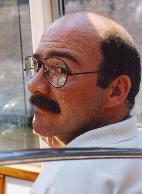
Quiet pioneer: Randy Coates, on travels with Bill, from the Lewis papers, CLGA. |
|
Mystery
|
Listening to speakers at the ACT vigil I thought: we have no language for this.
Randy's funeral told me we once had, rooted in what was once called faith -- inexplicable by definition -- that sets wordless meaning to death.
In September I attended two more memorials. One was ACT's annual candlelight vigil, held in Cawthra Park, the other a funeral for Randy Coates, who with Bill Lewis and Michael Lynch had been among the founders of ACT.
Randy had been ill for some time but kept it quiet, wanting to keep working and he had: just a few months before he'd been named head of his department in the university Faculty of Medicine.
His funeral was also scripted, not as a "celebration of life" like so many we'd seen, but by the United Church of Canada. It was held in the collegiate gothic splendour of the university's Knox College chapel.
Joan Anderson and I went together, she quietly but resolutely a Catholic. I wondered if she wondered at my resolute silence during hymns and prayers, but suspect not. I did it out of respect: it's not a thing to pretend. And to my surprise I found a new kind of respect there. I told Jane about it in October.
-
I liked the mystery of this rite (not that one gets much mystery in the United Church; a high Catholic Mass would be better): the consigning of a soul to god. But for a few reminiscences it was not personal, and much as we object that this is not who the person was, I thought -- no, this is who Randy was or he would not have wanted it like this, and he did.
What's more, there's something right in this, a shared faith in which the personal is subsumed and should be. I don't imagine many people there shared that faith, really. But the rituals come from a time when people did, when who a person had been was both remembered and truly given up, joined in faith to a higher power shared by the living and the dead.
ACT's candlelight vigil was meant to be a collective memorial. Yet it was not collective. The only way we seemed to know how to commemorate, in a secular sense, was to personalize. Lovers, mothers, carepartners spoke at length of George, of Ralph, of whomever.
Yet the people and the memories were not mine. They did nothing for me but get in the way of the people I needed to remember: Billy, Gram, Michael Wade, Michael Lynch.
"I was moved only once," I told Jane,
-
when we lit our candles and I looked up from the park and saw people looking down from the apartment balconies around us and thought how this must look for them: this wave of tiny lights, none named but for the many different names those distant watchers might give them.
Listening to those who spoke I thought: we still have no language for this. But Randy's funeral reminded me that we once did. It was a language abstract enough to include us all, powerful enough to leave us in awe and silence, at once together and alone.
Michael knew this. He wanted silences at his service, awkward ones in which we would not know what to do. There was odd spite in this -- that was Michael. But I think, too, there was a sense that only in silence can we even begin to feel the ineffable, that space where words can't be called on for easy comfort, where there's something -- something lost now but once called faith, inexplicable by definition -- that sets wordless meaning to death.
As Audre Lorde wrote in 1978, this something, this sense of meaning, "does not have to be called ... god, nor an afterlife." Nor even faith. Except as faith in life.
I came to see this committing of a soul to God as, instead, a commitment of each other to each other, to a community where the dead still have place.
***
I would get to say something like that two years later, speaking (despite my resistance to them) at another of those vigils in Cawthra Park, the permanent AIDS Memorial by then there.
As those candles were lit I would say that to each one its bearer likely put a name. Perhaps many; but most deeply felt likely just one, and in silence. I'd then note the people looking down from their balconies.
-
To that light you hold, each of them up there may put a different name, just as deeply felt, but someone else.
Will you mind? Will you mind that this act of remembrance -- your own, so intensely private -- is an act you also share? Will you mind that this light you hold will, and must, mean even more than what it so deeply means to you?
I think not. I think you know that what you hold is a gift to the world.
***
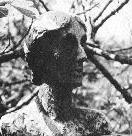
"Against you I will fling myself, unvanquished & unyielding, O Death!" Photo from John Lehmann's Virginia Woolf & Her World, Thames & Hudson, 1975. |
In late October I got to stand back without words, in a place I had long wanted to: sitting before Virginia Woolf, cast in lead, her gaze cast beyond the challenge of death.
I was in England again and again at Monks House, this time with Gillian Rodgerson. We had more than an hour there, wandered the gardens as I'd not been able to before, spent time in the house, particularly in Virginia's bedroom, entered from the garden.
We rather disappointed the nice National Trust lady there, rushing past her spiel to look at foreign editions of Woolf's work on one of the two book shelves. I found some in Japanese; working hard to transliterate I could decipher only Va gi ni ah Wa ru fu.
The day before Gillian and I, doing a further Bloomsbury turn, had toured Knole, both overwhelmed by the vast ancestral pile that Vita Sackville- West had so loved. Jane Rule told me once she had found it full of horrendous junk. I did too, knowing nothing about ancient furniture, brocades, silver plate.
Our favourite moment came on walking back out the grand tower gate, finding there a set of ordinary modern doorbells with green dymo tape labels. The last one read "Lord Sackville."
***
|
"Go on and on; never stop."
|
I was staying with Gillian and Lesley Jones in their rambling, two storey flat over a Midland Bank on Kilburn High Road. It was often cold. Gillian and Lesley would drag a small electric heater under the table to warm our toes while we ate; to chat otherwise we gathered around a gas fire at one end of their big front room.
I was truly warm only in bed, which a few months later would be Kevin Orr's bed, he planning a move to London. Very soon the place would have another inhabitant: Samuel Connah Rodgerson, Gillian's son, with whom on this visit she was pregnant, a man she worked with at Gay Times the father by artificial insemination.
Outside it was cold, too, and rainy, not the best season for jaunts around London. But I did get in a few. One was to Hackney for lunch with Andrew Alty. We lolled in his apartment all afternoon talking theatre; he had just finished directing a production of Tennessee Williams's The Leftover Heart.
The next day was lunch with Neil Bartlett at the Drill Hall Arts Centre, where the production company for a film he was doing had offices. We had only an hour -- he was off to scout locations -- but it was a good hour.
We'd had a few more earlier, in Toronto in July, when he was here with a play done entirely in Latvian but for he and co- director Banuta Rubess offering a sort of Greek chorus in English. It had also run in London with Neil's Gloria theatre company. ("The name," Neil once wrote me, "is so that I can leave a message on my answering machine saying: Hello, this is Gloria.")
By now he had translated Moliere's Le Misanthrope and Racine's Berenice for production, had done two of his own, Sarrasine and A Vision of Love Revealed in Sleep, and was basking in American publicity for Ready to Catch Him Should He Fall, released in the US only this year.
Before I left for England I'd found Neil as coverboy on the New York Native and Christopher Street, interviewed in both, and reviewed glowingly in the Village Voice and the New York Times Book Review.
After this visit I wrote him, thanking him again for Ready to Catch Him (which I'd just reread), closing with: "Go on and on Neil. I've said it to you before: never stop."
***
I got to see Sue Golding twice: once with Gillian to hear her on a panel (on sex, of course) at the Institute of Contemporary Art; and on my last Friday night in town for dinner and a roam around The Bell, a hot late licence club in Pentonville Road.
We didn't get out until 2 am, went to Sue's place, talked endlessly fueled by very good scotch, and she tied me up -- just my wrists and just in play. But it's always play, she would say. I get to say I've been tied up by no less a master than Sue Golding.
As ever, she was a joy. I didn't leave her place until 6:30 in the morning, finding myself alone on a platform of the North London Railway, drunk enough to talk to myself out loud. So I did.
I got off at Kilburn High Road, blessedly calm for a change, undaunting, as so little of grey, roaring London had seemed on this trip. But I would see it again in better times -- and, this time, quite enjoy myself on the way home.
- Monday, November 4, 1991, to Jane:
Home finally in an aisle seat on a British Airways 747 (after getting to Heathrow early, if not early enough, to get a window), squeezed on the left by a giant German accented man from Niagara Falls, overflowing his tiny seat.
But there was pleasure across the aisle: two quietly butch pups, early 20s I'd guess, lushly compact, serious, polite to the much older man next to them. One read a textbook for a while, the other the latest novel by Julian Barnes. They were very much a pair, their heads touching as each slept in turn on the other's shoulder.
If these are lovers, I thought, then the revolution has truly come: they were entirely unselfconscious in their physical comfort with each other.
More likely they were pups from the same litter: they took each others' bodies so for granted that I suspected they were not simply brothers but twins. One of them filled out both their Customs cards, but, spy that I felt, I wasn't close enough to find out.
No matter. It was delicious that two hunky babies -- gay or straight -- could be so intimately at ease in a crowded airplane. I was in love for seven and a half hours.
***
Barry had said he might be back in town briefly this year. I had known not to wait but a few months before had begun to. On Thursday, March 14 Randy's new roommate saw me on Church Street and said: "Have you heard from Barry?" He was here, had called Randy but wasn't staying with him.
The next morning I found a message at work, mostly in hiragana but enough English to tell me he was staying at the Westbury, right across the street. We connected, went to my place, and he said: "Buy me a beer?"
It was much as it always had been: lots of talk, tension past. He was here only two days, then off by train, heading east. He'd work the summer in St John's and then go to Montreal, where he might -- or might not -- meet Dinos, the two of them still together.
Parting in Japan they'd picked a place from the Spartacus Guide, a date, a time, each agreeing to show up and wait a half hour. "If he doesn't show up," Barry said, "well, that's that."
"That's not true," I said to him, "you care that he'll show up." "Yeah, but I want him to be there because he wants to be." With a hug at 3:30 Barry was gone, truly gone by Monday, when his train left, my adrenaline not settling until then. As I said to Jane:
-
So it's over. It has been for six months, really, but now it's over well, not badly. We're all right with each other -- and he's gone.
Still, I know it wouldn't matter to me to have him so clearly gone if I didn't still want him. The want will go. Mostly it has. But I'd like to think the love won't and that it shouldn't. He's as messy and good as I always knew he was.
Wanting him beyond reason was a mistake -- one I'm sure I'll make again (that's the nature of the beast, isn't it?). But it was no mistake to love him.
***
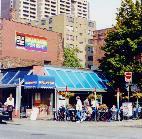
Few families; no unicorns: But Barry by surprise. Now The Village Rainbow. |
With him out in a bar in 1999, he seemed a tourist to me. Worse: I felt a tourist.
The greatest erotic obsession of my life -- yet if this moment, & not that one in 1986, had brought me the first sight of him, I might not have noticed.
That might have been the last of Barry, but it wasn't. In September 1993, walking past the Unicorn Family Restaurant on Church Street (which saw as few traditional families as it did unicorns) -- I'd see him, sitting in the window with a man dark haired, rather heavy faced. I went in. This was Dinos; seems he had wanted to be there.
They were here only because it was cheaper to fly from Toronto than Gander to London. That was their next destination; the last while had been Hyderabad, Delhi, Katmandu, and two years of work in Seoul. We talked easily for 10 minutes. I left feeling fine and headed on my way, to an afternoon beer at Woody's.
Barry did call Randy, just before his flight -- another flight as usual. On that 1991 trip back, when a Customs officer had asked his address, he was pleased not to have one. That December I got Barry's last correspondence, a Christmas card. "We are moving to Kuwait," it said. "Who would have thought." It had no return address.
Randy had become a volunteer at ACT; he died in February 1995. I didn't know if Barry ever heard; I had no way to tell him.
But I'd later find out he had. One morning in July 1999 my phone rang, the voice on the other end saying: "Hi! Know who this is?" Even not having heard that voice for more than five years, I did.
We had lunch, got together at my place, beer and talk, the usual. But not the usual, really. I'd wondered just after his call: what if I still want him? Or he me? I saw no evidence he did; more to my surprise, I found I didn't either. He still looked wonderful if mostly grey, less than a year from 40. But I felt no buzz.
He'd found a fixed address or two, in Kuwait and then the United Arab Emirates all these years, still with Dinos. He didn't much like it, found no community there but ancient Brit expats into Arab boys. Barry was not.
He wanted a new address now but didn't know where: England was possible, Dinos a UK citizen, but Barry didn't like England; maybe Canada -- but not Newfoundland. If Barry had remained in my mind inseparable from The Rock, in his own he had not.
We went out together one night, a minor bar hop. Nothing was the same as he'd known it, having known it a decade before. He was antsy, bored: Where's the party? He had a few days left in town after that; maybe he found one.
With him in one of my favourite haunts that night out (one I have yet to show you), he seemed a tourist to me. Worse: I too felt a tourist. Here I was with the greatest erotic obsession of my life and I realized: If this moment in July 1999, and not that one in June 1986, had brought me the first sight of this man, I might not have noticed him at all.
Well, I suppose that's passion for you.
***
I do still have that Japanese robe, though I've hardly worn it; those prayer sticks in their purple drawstring bag, too.
And that fierce little daruma. I never did paint in its eyes. Now I suppose I never will. But the little guy is kind of cute.
Go on to Part Six: 1992-1995 Dancing boys
Go back to: Contents page / My Home Page
This page: http://www.rbebout.com/bar/1991b.htm
December 1999 / Last revised: June 19, 2003
Rick Bébout © 1999-2003 / rick@rbebout.com
